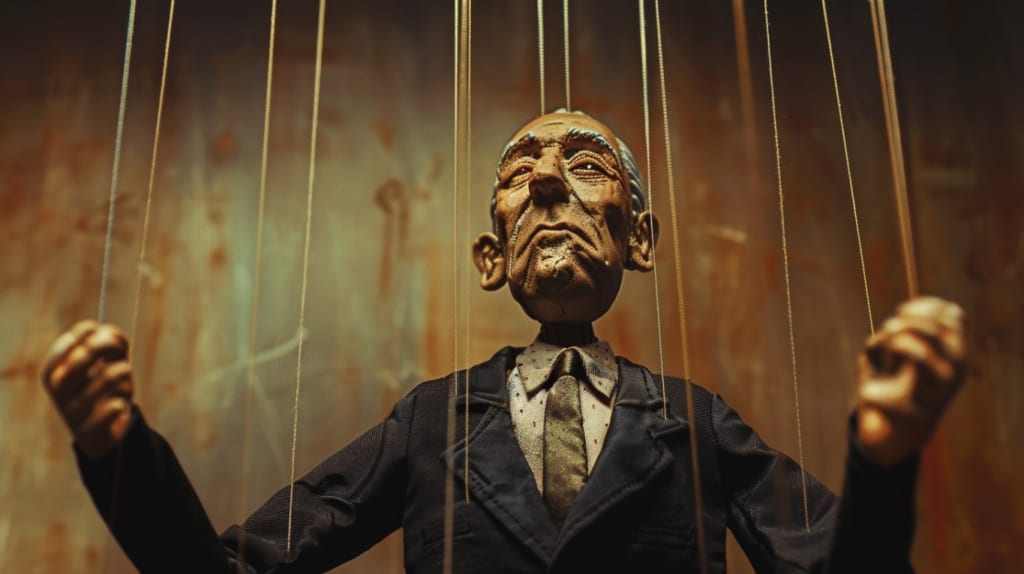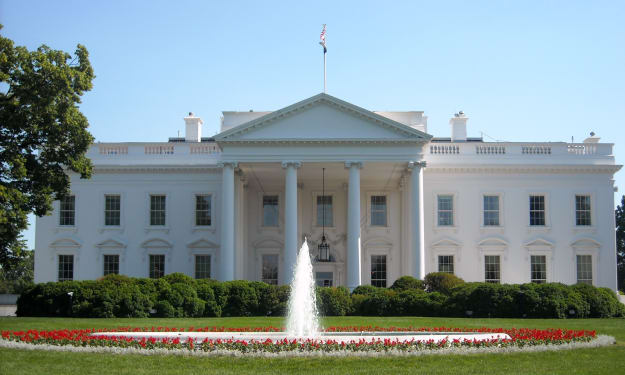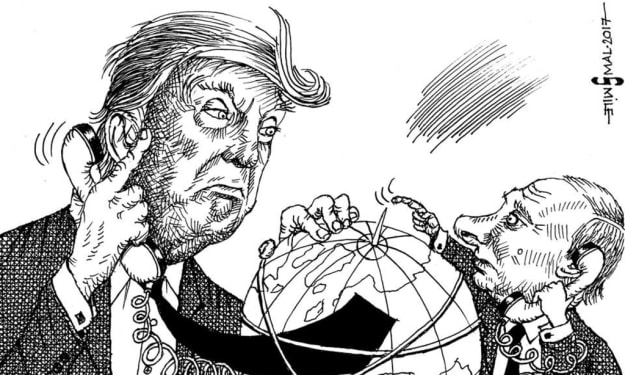Puppet Masters
The Hidden Hands of Power in Politics

Introduction
In this complex web of global politics, this idea that the world leaders are actually puppets moving to unseen forces is not some sort of conspiracy theory but fact. The story details real examples of leaders whose agendas are really controlled by party apparatchiks, corporate interests, and special lobby groups, explaining how endemic the corruption is and just how hard making independent decisions really is.
The Illusion of Autonomy
When a citizen elects a leader, too often, he or she really believes that he is electing a person with a free will and independent mind to guide the nation towards his vision and promised goals. That is rarely the case. At the very start, leaders are strapped down to many responsibilities, mainly emanating from party expectations, corporate interests, and the pressure from the lobbyists.
The United States: The Lobbyists' and Corporations' Influence
Example: Barack Obama and the Affordable Care Act
When Barack Obama came into office in 2009, he promised to affect change in health care. However, the process of enacting the Affordable Care Act showed that the power and presence of effective lobbyists and corporations within American politics are huge.
Pharmaceutical and Insurance Industry Lobbying: Millions were spent by the pharmaceutical and insurance industries to lobby against some of the provisions in the ACA. Key provisions, like the public option, were weakened or eliminated by these powerful constituencies.
Campaign Contributions: Like many other campaigns before this one, his received enormous contributions from health insurance and pharmaceutical companies. In exchange, such financial dependency spawned an environment where policy decisions were made that far too easily transmitted donors' interests rather than the general public's.
Outcome: While the ACA did increase healthcare access, it represented an imperfect solution, having been hobbled by the powerful influence of lobbyists. The Obama example serves as just one illustration of the way that even the most senior leaders are hamstrung by the necessity to support party interests and finance contributors.
The United Kingdom - The Power of Party Politics
Example: Theresa May and Brexit
The premiership of Theresa May has been marked by Brexit. Her struggle to guide the United Kingdom out of the European Union unveiled the bounds of her power and her party's stranglehold.
Internal Party Conflicts: The Conservative Party was so divided over the topic of Brexit. The hard core Brexiteers were in open conflict with the pro-EU members, therefore making it almost impossible for May to come up with a deal that would please every faction of the party. The constant infighting weakened her bargaining position and robbed her of authority.
Party Pressure: May's Brexit deal was first rejected multiple times in Parliament due to her own party opposing the majority of its content. This lack of united support clearly pointed out cases in which party politics and feuds outweigh the leader who is supposedly in charge.
Outcome: May's eventual resignation further underlined how party dynamics and internal divisions can undermine leadership, which FIFA so effectively proved to all by avoiding effective decision-making and governance.
Brazil - Corruption and Political Manipulation
Example: Luiz Inácio Lula da Silva and Operation Car Wash
Luiz Inácio Lula da Silva, alias Lula, was the President of Brazil from 2003 to 2011. His case while heading the presidency and after his term faced legal proceedings which testify to the political corruption and manipulation that has been fostered in the very roots of Brazilian politics.
Operation Car Wash: This was an extensive anti-corruption investigation that unveiled a scheme of bribes and kickbacks at Brazil's state-controlled oil company, Petrobras, which involved a number of politicians. Lula was accused of taking bribes as president, something he vehemently denied as political persecution.
Judicial and Political Bias: A conviction of Lula was done with alleged judicial bias. Political manipulation was also apparent in his imprisonment. The leaked messages suggested collaboration between prosecutors and judges to ensure his conviction, which ultimately puts into question the impartiality of the judicial process.
Outcome: The Lula case is an epitome of how corruption and political manipulation compromise justice and democracy. As much as leaders have turned perpetrators, they have also been victims under this corrupt system.
Russia - The Tight Grip of the Kremlin
Example: Vladimir Putin and the Centralization of Power
Vladimir Putin's long presidency has been marked by centralization of power and suppression of dissension. In that, through his iron grip over the political scene, it goes a long way in showing how far one man—even a leader—can dominate the system but still be a puppet of elite interests.
Oligarch influence: Having accumulated the means and power in the post-Soviet times, Russian oligarchs would not fail to turn up in a big way in setting political course and directions. While Putin clipped the wings of some oligarchs, there are many who remain influential able to ensure that their interests are accounted for in government policies.
Suppression of Opposition: The political regime under Putin has tightened its noose on political opposition, media freedom, and civil society. It forms a sense of stability and image but also showcases that it lacks democratic processes or manipulates the political outcome.
Outcome: This scenario in which Putin holds the grip over power depicts how leaders might seem all-powerful while acting within the structures that powerful elites and systemic corruption have created.
These are real-life examples of a scary truth: world leaders act with much mystery due to a complicated web that underlyingly seizes them from party politics to corporate interests, etc. Their potential for independent decision-making is thus often weakened by the very need to assuage power brokers on various fronts and retain political stability.
Opinion
• Transparency and Accountability: What political reforms will make the system more transparent, less susceptible to the influence of money in politics?
•Judicial Independence: How might the independence of the judiciary be safeguarded to prevent political manipulation?
•Engaging Citizens: What would make citizens more effectively involved in political processes to hold leaders accountable and represented?
The story that world leaders are puppets moved by their parties and other powerful interests is yet another loud wake-up call to modern democracies. From the sway of the pressure groups and corporate interests to biting corruption and suppression, these issues gnaw at the very root of democratic governance. The route toward redressing such challenges is through a rigorous institution-strengthening effort that will help the leaders of nations work in the best interest of people rather than at the whim of a few powerful elites.
In that sense, the story of world politics has been one of might and marionettes, when mostly the controller remains beyond till the cordoned-off areas of common visibility. An understanding of these dynamics and learning to respond to them is the way toward a more proper democracy and ethical governance.
Your support is GREATLY appreciated!!
If you enjoyed this story and would like to see more of my work, please consider following and liking my page. As a new writer, your support means the world to me and helps fuel my passion for creating more engaging and entertaining content. Your feedback and encouragement are invaluable, and I look forward to sharing many more stories with you! Thank you for your support!

About the Creator
Dave Karpinsky, PhD, MBA
A world traveler, educator, consultant, entrepreneur, husband and a father sharing his experience and wisdom. Join me as I weave my narrative, offering a window into a life lived fully and passionately. Please subscribe :-)
Enjoyed the story? Support the Creator.
Subscribe for free to receive all their stories in your feed. You could also pledge your support or give them a one-off tip, letting them know you appreciate their work.






Comments
There are no comments for this story
Be the first to respond and start the conversation.